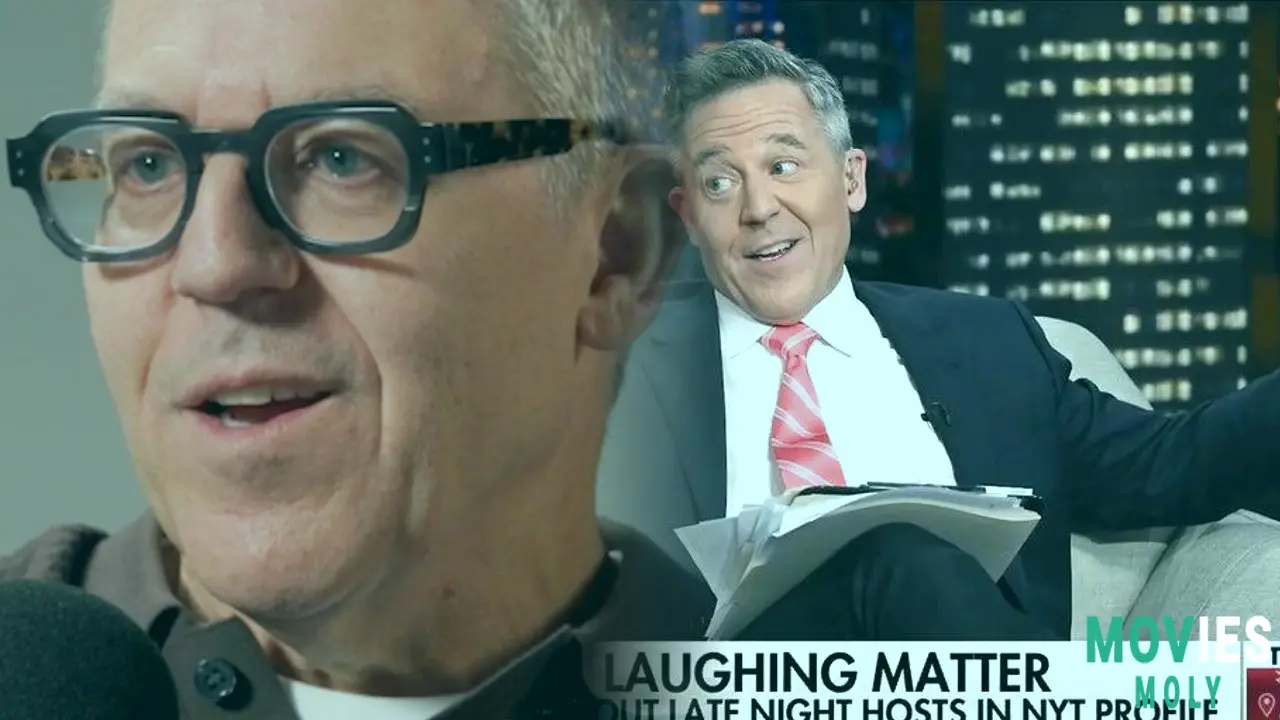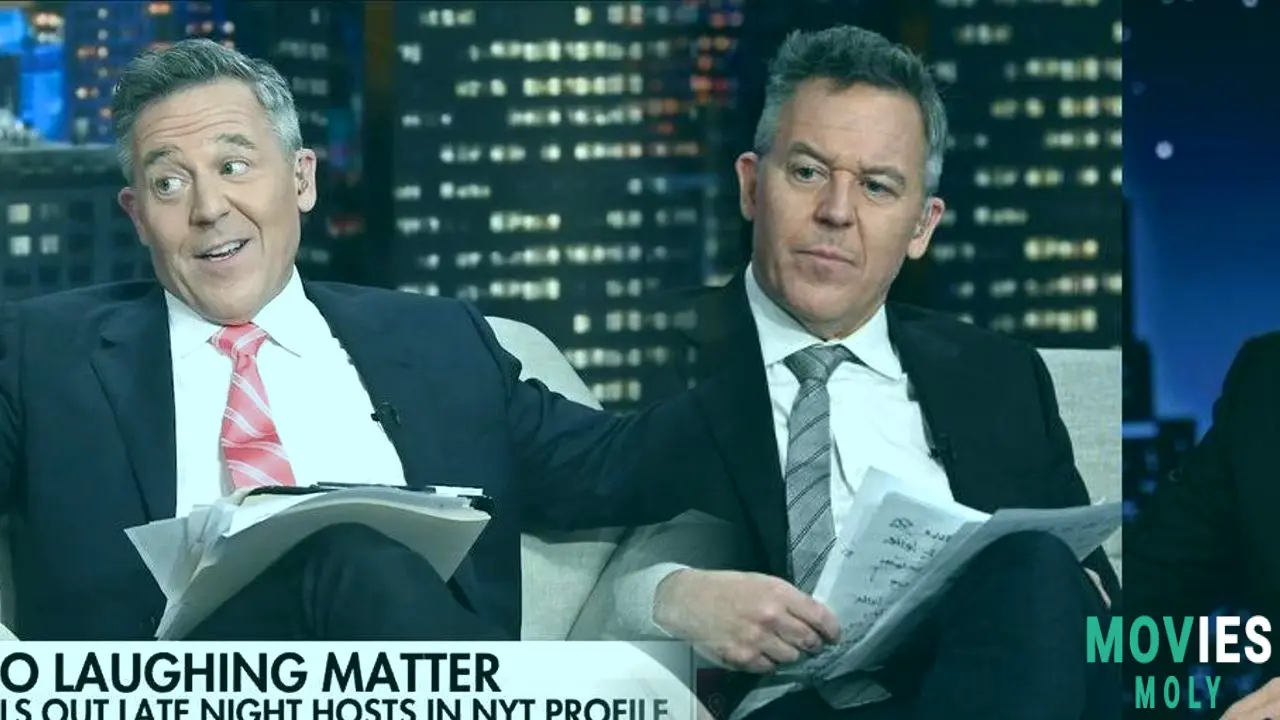Fox News host Greg Gutfeld didn't hold back, linking Jimmy Kimmel's recent suspension and Stephen Colbert's tenure to what he calls "entertainment welfare," suggesting political alignment is more crucial than ratings for late-night hosts.
TL;DR
- Greg Gutfeld claims Jimmy Kimmel and Stephen Colbert have benefited from "entertainment welfare," where networks prioritize anti-Trump political stances over declining ratings.
- Kimmel was suspended in September 2025 after making controversial comments about the alleged murderer of conservative influencer Charlie Kirk.
- Gutfeld is actively trying to capitalize on the perceived "dying" traditional late-night landscape, seeing Kimmel's situation as a "prime opportunity" for his own shows.
Imagine a late-night show with declining viewership, yet its hosts remain firmly entrenched. What's keeping them on air? According to Fox News's Greg Gutfeld, it's not traditional entertainment value but something he provocatively terms "entertainment welfare." Gutfeld, known for his direct style, recently laid out his case, pointing fingers directly at long-standing late-night figures like Jimmy Kimmel and Stephen Colbert.
In a candid interview with David Marchese of The New York Times, Gutfeld questioned why these hosts have been around for so long, despite what he perceives as plummeting numbers. His answer? They've "toed" an anti-Donald Trump line for years, a stance he believes their corporate bosses are more than happy with, irrespective of ratings. It's a bold claim that suggests the priorities in late-night television have fundamentally shifted from pure viewership to political alignment.
The September Suspension of Jimmy Kimmel and its Aftermath

This theory gained particular traction in the wake of Jimmy Kimmel's unexpected suspension. From September 17 to September 22, 2025, Jimmy Kimmel Live! was yanked off the air by ABC, a broadcast network owned by The Walt Disney Company. The reason? Controversial comments Kimmel made on his September 15 show regarding the man who murdered conservative influencer Charlie Kirk.
Kimmel's comment suggested that the "MAGA gang" was "desperately trying to characterize this kid who murdered Charlie Kirk as anything other than one of them." This implication, suggesting the murderer was a Trump supporter, was reportedly contrary to actual reports. The backlash led to the temporary ban, and even after the suspension was lifted, some ABC affiliate stations initially balked at carrying the show before eventually relenting. This whole situation, for Gutfeld, highlighted a perceived double standard.
Gutfeld on Kimmel's Suspension: "I hate to tell you, buddy, but the guy who shot and killed Charlie Kirk was more likely a fan of yours." — Greg Gutfeld, Fox News Host
Stephen Colbert's Longevity and the Political Jabs

While Kimmel faced a tangible suspension, Gutfeld also referenced what he called Stephen Colbert's "recent cancelation" during the same interview. Although the provided articles don't offer specifics on a formal cancellation for Colbert, they do note his long history of ripping into Trump on his CBS program. An infamous example cited is Colbert's crack during Trump's first term, implying the president's mouth was being used as "Vladimir Putin's cck holster."
For Gutfeld, both Kimmel's suspension and Colbert's enduring presence fit into his "entertainment welfare" narrative. He suggests that these hosts provide a "therapy session for people that were upset at the world" rather than genuine entertainment. This perspective posits that the shows cater to a specific political grievance, and that loyalty to this narrative is rewarded by networks, despite what Gutfeld believes are low viewership numbers.
Gutfeld's Strategic Ascent in a Shifting Landscape

Amidst these strong opinions, Gutfeld isn't just an observer; he's an active player in the late-night arena. As the host of Fox News's Gutfeld! and a co-host of The Five, he's clearly paying close attention to the dynamics. An insider claimed that Gutfeld views Kimmel's "comedown" as a "prime opportunity" for himself, believing his own political leanings position him as "the flavor of the moment."
This isn't just about winning a debate; it's about business. Gutfeld reportedly intends to "use that to line his pockets," boasting about his success and contemplating even adding another show to his resume. He sees himself as having "crushed them like bugs" and views the overall decline in traditional late-night ratings as validation for his approach, which leans into a more conservative, politically charged comedy.
The Broader Implications for Late-Night Television's Future
The core of Gutfeld's argument hinges on the idea that "traditional late-night shows are dying, with ratings declining for all of his competitors." If true, this represents a significant shift in how networks approach programming and talent. Instead of chasing the widest possible audience, the focus might be on securing a loyal, politically aligned demographic, even if it's smaller.
This dynamic presents a trade-off: broad appeal vs. niche political resonance. While a network might lose some viewers by taking a strong political stance, it could gain a deeply engaged audience that feels represented and understood. Gutfeld's rise suggests that this niche is growing, and he's actively positioning himself to dominate it.
Addressing Counterpoints and the Nuances of Network Decisions
It's important to consider counterpoints to Gutfeld's bold claims. One could argue that Gutfeld's "glee is completely self-serving." While his observations about viewership and political leanings might hold some truth, his motivation is clearly to elevate his own brand and shows at the expense of his competitors. This isn't just an objective analysis of the industry; it's a strategic attack aimed at carving out more market share for Fox News's late-night offerings.
Furthermore, the term "entertainment welfare" is Gutfeld's subjective framing. While networks certainly consider ratings, the reasons behind keeping a show on air are multifaceted. They can include long-standing talent contracts, the show's value to overall network branding, its ability to attract specific demographics for advertisers, or even its digital presence beyond linear TV ratings. To attribute continued presence solely to political alignment might oversimplify a complex business decision, although Gutfeld insists there are "never any larger corporate-political considerations."
Example: Sarah, a longtime fan of late-night comedy, used to tune into various shows for lighthearted humor and celebrity interviews. Over the past few years, however, she found herself increasingly frustrated by the consistent political monologues, feeling they often preached to a choir she wasn't always a part of, regardless of her own views. "It just stopped being about laughs," she explained to a friend, "and more about telling me what to think about the news. I just want to unwind." This shift in focus led her to seek out alternative content, reflecting the very audience fragmentation Gutfeld aims to capture with his more direct, politically charged commentary.
Practical Takeaways for the Future of Late-Night- Political Alignment Matters More: Gutfeld’s comments suggest that for some networks, a host's political stance might be as valuable as, or even more valuable than, traditional ratings.
- Niche vs. Broad Appeal: Late-night TV appears to be increasingly segmenting, with shows either embracing a strong political identity or struggling to maintain broad appeal.
- The "Welfare" Debate Isn't Settled: While Gutfeld attributes longevity to "entertainment welfare," the underlying motivations for networks are likely complex, blending political messaging with business strategy.
- Viewership is Fragmenting: Audiences are increasingly looking for content that aligns with their specific worldviews, creating opportunities for hosts like Gutfeld who lean into a defined political lane.
What specific comment led to Jimmy Kimmel's suspension?
Jimmy Kimmel was suspended after he implied on his September 15, 2025, show that the individual who murdered conservative influencer Charlie Kirk was a Trump supporter, a claim reportedly contrary to official reports.
What does Greg Gutfeld mean by "entertainment welfare"?
Gutfeld uses "entertainment welfare" to describe a scenario where he believes late-night hosts like Kimmel and Colbert are kept on air despite declining ratings because their anti-Trump political stance is favored by their corporate networks.
Was Stephen Colbert also suspended or "canceled"?
According to Gutfeld, Stephen Colbert also experienced a "recent cancelation." However, the provided articles don't offer independent verification of a formal suspension or cancellation for Colbert, only noting his long history of strong anti-Trump commentary.
How does Greg Gutfeld plan to capitalize on these situations?
Gutfeld sees the current turmoil in traditional late-night TV as a "prime opportunity" to expand his own influence and shows. He believes his political alignment makes him "the flavor of the moment," intending to use this advantage to further his career and "line his pockets."
Sources- Mediaite, "‘Entertainment Welfare’ Gutfeld Says ‘Only Reason’ Kimmel and Colbert Were on the Air Is They ‘Toed’ Anti-Trump Line," November 09, 2025.
- RadarOnline.com, "Greg Gutfeld considers Jimmy Kimmel's suspension 'prime opportunity for him'," November 01, 2025.
- RadarOnline.com, "Gasbag Greg Gutfeld smells blood in the water in the wake of Jimmy Kimmel's temporary suspension and is plotting to use the controversy to reap a windfall," November 01, 2025.






